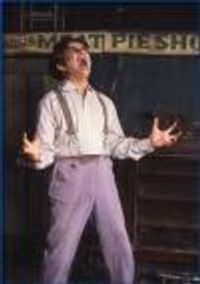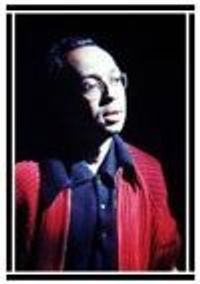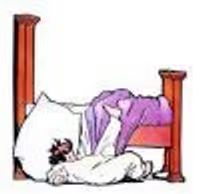A question about 'Angels in America'
Urban
Broadway Legend Joined: 2/27/05
#0A question about 'Angels in America'
Posted: 10/18/05 at 8:01am
Has Tony Kushner ever explained why Joe Pitt's story line was never resolved? We basically had resolutions/closure to all the other major characters yet Joe was last seen at the point where Harper left him (or in the mini-series the tacked on subway scene with Hannah that did nothing).
I guess since the character was the one I did identify with (What can I say, I'm a gay Mormon) it left me a little cold at the end of the play not to know what happened to Joe (which is kind of sad because otherwise I thoroughly enjoyed the entire experience).
One of my friends mentioned Tony Kushner never liked Joe which suprised me because Joe (for me at least) came across as the most human of all the characters. Everything isn't perfect and yes we all do things we are not proud of and that are not 'right'.
#1re: A question about 'Angels in America'
Posted: 10/18/05 at 8:12amYeah, he does kinda get left in the dust, although it's hard for me to say what Kushner's intention was with that, as much of Part II just confuses me...
#2re: A question about 'Angels in America'
Posted: 10/18/05 at 8:21am
I don't know if Kushner on himself has ever commented, but I do remember reading in the book 'Approaching the Millenium: Essays on Angels in America' that it seems Joe is excluded from the little group at the end (and therefore from resolution of his story) because he did not redeem or alter himself by the end of the play. The theory (I can look it up properly if you want) was that everyone else has learned, or altered their state of mind by the end buy Joe is still stuck hence his story is left in limbo whereas Harper gets to be free, Mrs Pitt gets a new life in NY etc etc. I think the kind of change or 'redemption' Kushner wanted us to want for Joe was to accept who he was at the very least, and in a more idealistic sense perhaps change his job/political views. However the fact that one character remains in limbo, mostly unchanged seems (to me) Kushner's reminder that not everything is resolved in life.
Hope that helps
Urban
Broadway Legend Joined: 2/27/05
#3re: A question about 'Angels in America'
Posted: 10/18/05 at 9:06am
That helps alot Emilia. Cannot admit to agreeing with the sentiment (I don't think people should change their political opinions just because they are gay - I certainly have not). I don't like that train of thought because it leads to accusations of being an 'Uncle Tom' which I find repugnant. (Not to mention the 'modern meaning' of the term 'Uncle Tom' is actually a total misrepresentation of the Character from the book by Harriet Beecher Stowe. Héhé. I once dated an English Major and I got that particular point drilled in me!) But that is beside the point. ![]()
Maybe I just see things from a prospective a non-Mormon cannot see from. Going from a closet-case Mormon to an openly gay Mormon is a big leap for me at least. In fact I think Joe had a bigger 'change in character' then Louis or Belize (in fact Belize didn't really change at all - though I will accept he proberly was the 'barometer character' and wasn't meant to change).
I just think it is weird that we started out the play showing that gay men are not forced in one narrow place in the political spectrum. We can have liberal gays and we can have conservative gays. And then at the end the conservative gay guy didn't have resolution because 'he didn't change' which to me means 'he didn't become a liberal'.
#4re: A question about 'Angels in America'
Posted: 10/18/05 at 9:14amI've never read anything on him, either, but I too assumed that his being left out of the overall resolution was intentional. He's totally lost at sea. I don't know that I think it's just because he was conflicted sexually, but he was in a lot more ways than that -- he had no idea who he was, other than a cookie-cutter version of who he was "supposed," to be, and he couldn't yet wrestle with that.
#5re: A question about 'Angels in America'
Posted: 10/18/05 at 9:26amJoe is still stuck. Yes he is out but there is still shame. I think all the other charecters including Hannah and Belize have some sort of moment of clarity. of realization. Joe has his doubts and his shame and most importantly his confusion.
roquat
Broadway Legend Joined: 5/25/05
#6re: A question about 'Angels in America'
Posted: 10/18/05 at 10:11amThis is actually something that really infuriated me the first time I saw the play. Joe is so emotionally naked (especially as portrayed by the actor I saw) that many people who have struggled with their sexuality identify completely with him. To have him thrust aside and dismissed at the end seems a cruelty on the part of the playwright. I got the feeling that Kushner hated this character he had created more than the circumstances really warranted. After all, Roy Cohn, seen as the embodiment of evil in the play, receives an absolution of sorts, but poor, frightened, confused Joe must be punished. I don't get it.
#7re: A question about 'Angels in America'
Posted: 10/18/05 at 12:53pm
I agreee with a couple of things here- the opinion I put before wasn't mine as I said, it's something I read-perhaps I should explain I am begining research into this play for my dissertation (more broadly about how America has represented the AIDS crisis culturally) just so you know where i'm coming from..
Anyway, my (personal) view on reading the play is that Joe is left out of conclusion because he has yet to come to one himself, as Harper tells him to get lost with the valium, he is also already lost in himself. I think it may have been a choice to leave him out for that reason. He also is shown as absent from the little group at the end because he has shown himself to be incompatible with their way of thinking, which is probably judgment on Kushner's part, possibly not.
just more of my ramblings
Urban
Broadway Legend Joined: 2/27/05
#8re: A question about 'Angels in America'
Posted: 10/18/05 at 1:02pm
A dissertation?
Wow. I'd love to read it when you eventually publish it!
(Sorry for reading a bit to fast and not seeing you where just relaying the infomation and what you wrote wasn't actually your opinion).
#9re: A question about 'Angels in America'
Posted: 10/18/05 at 1:37pm
Oh boy, this has always been something that bothered me about this play. Like you, Urban, Joe is one of my favorite characters in the play. He's coming from a place where he has a lot to deal with and I never understood why Tony Kushner left him out in the cold. I suppose from only the storytelling point of view, Joe represents the-villain-who-must-be-overcome in Harper's story and the catalyst for Louis' redemption. Since Louis is Tony Kushner, Joe was doomed from the start, although Louis is really the more repugnant character (in my opinion). Even Joe's mother Hannah gets redeemed. Presumably the mold for Joe's personality. I always thought Joe ended up being a character who had so much more to him then Tony Kushner even meant. You can't hate him, he's so child-like.
One wonders why in a play about change and acceptance the character with the biggest (and really, most poignant to the overarching story besides Prior) journey is the character who doesn't complete it. Is it because he is a mormon and a republican? I suppose if you look at it that way it's little more than a hate statement from Tony Kushner.
Man, I want to write that guy a letter now.
joey
roquat
Broadway Legend Joined: 5/25/05
#10re: A question about 'Angels in America'
Posted: 10/19/05 at 12:16amTony Kushner said that the scene in the play where Joe hesitantly comes out to his mother over the phone was something that happened to him. That scene and several others are so true to the anguish and fear several gay people felt growing up that the punishment heaped on Joe at the end seems all wrong. Maybe it was just an accident of casting or something, but in the small regional production I saw, the actor playing Joe was so painfully vulnerable that I felt more for him than any other character, and I left the theatre offended instead of exhilarated.
#11re: A question about 'Angels in America'
Posted: 10/19/05 at 12:44amEmilia - I'd looooove if you'd send me a link or an author, etc. on that book you mentioned (approaching the millenium: essays on angels in america - I think tha'ts the title, lol) - I'd LOOOVE to read it! :)
Urban
Broadway Legend Joined: 2/27/05
#12re: A question about 'Angels in America'
Posted: 10/19/05 at 5:36am
Thanks for that wonderful answer Roninjoey! If Joe was the 'villian that must be overcomed' I think Kushner totally went about the wrong way in making him the villian. At least for me he came off more palatable then Lewis. Frankly Lewis was just as big a 'jerk' if you will as Joe ever was.
If the reason was he was Mormon I am truly insulted because I am both happily gay AND Mormon. I don't have any conflict with it.
Hehe. If you write a letter you might just wanna make me write one!
#13re: A question about 'Angels in America'
Posted: 10/19/05 at 9:49am
I am about to go into rehearsals to play Joe Pitt in Part One. This thread has my heart racing about the challenge ahead of me. Thank you for that.
Urban, if you don't mind, I will likely pm you at some point. Your insights may be prove useful!
David
Urban
Broadway Legend Joined: 2/27/05
#14re: A question about 'Angels in America'
Posted: 10/19/05 at 11:51amPlease PM me away! I am not sure how much help I can be, but I'd love to help in anyway!
#15re: A question about 'Angels in America'
Posted: 10/19/05 at 11:53am
Thanks! I am about to get on a plane to Italy for two-and-a-half weeks, but when I return ...
Urban
Broadway Legend Joined: 2/27/05
#16re: A question about 'Angels in America'
Posted: 10/19/05 at 11:58amPlease PM me away! I am not sure how much help I can be, but I'd love to help in anyway!
Jazzysuite82
Broadway Legend Joined: 2/6/05
#17re: A question about 'Angels in America'
Posted: 10/19/05 at 2:49pm
I never really understood why so many people could identify with Joe. I find that interesting that people think he was left out in the cold. He certainly wasn't in my point of view. I agree that Joe's character doesn't really change by the end. Sure he's been through all that he has been through, but those situations don't alter his view. As a matter of fact Joe's character is the only one who really doesn't. His mother changes dramatically, his wife actually leaves him. He goes through everything he does and his solution is to stay with Harper and try to resolve his homosexuality. I think he actually says something like it doesn't matter what a person is so long as he tries not to be that thing. I'm obviously paraphrasing here. He doesn't want Harper to go, he wants Harper to help him hold on to the typical American dream. He's scared of his homosexuality. He admits it and then recants it. He's the only one that doesn't face his fears. I think Kushner is treating Joe like every other homosexual that comes out and then tries to go back in. He doesn't deserve resolution in his plot. He's stuck.
Anyway that's my theory. Uhmmm who said that Louis was Kushner?
#18re: A question about 'Angels in America'
Posted: 10/19/05 at 11:53pm
Um...my 2 cents...
Joe isn't "out" at the end of the action of the play.
(b4 the final flash-forward scene at the fountain)
If Joe is still not out when the fountain scene takes place...why the hell would he want to hang out with 3 queers and his mom? People who aren't out don't usually like to walk around in public places with people who are OUT OUT OUT.
Also, whether Joe is out or isn't...um...his mom is hanging out with the 1st man to ever break his heart into a million pieces. Would he really want to hang out with Louis after Louis dumps him?
If Joe is still a Republican...he really can't hang out with these men. In the 80's (and much of the 90's, and still in many places today) you can not be a Republican and hang out with the queers. period.
you can be as gay as you want if you hide it in your closet next to Hoover's pumps and Roy Cohn's poppers, but once you're out...buh-bye.
Don't you also think that wrapping up every story in a neat little bow would be kind of trite? And what about Harper? She gets just as much of a resolution as Joe.
As do the angels.
And another reason Joe might not get to hang with the others at the fountain...If I was Louis...or Prior...or even Belize...I'm not sure I'd be able to hang out with a closeted gay republican without grinding my teeth down to the nubs or smacking him silly.
Without getting into whether being a gay republican is evil and stupid or smart and good...let's just say that I'd not relish the thought of spending an afternoon with someone who stands for so many of the things I despise. (it goes way beyond gay, baby...that's barely even the tip of the tip of the iceberg). And why would Joe want to hang out with people who do not like him?
Right or wrong...life is too short to spend it hanging out with people who make you want to spit nails. Unless you're being paid to.
As for resolution...what would you have TK write?
I like Joe's ending. it avoids the false moralizing of an ending that shows him miserable, and it avoids the false "happily ever after" also.
Our imaginings of Joe's life are much richer than any simple solutions.
and, finally...if TK had resolved Joe's story...the play would have been 8 hours long.
#19re: A question about 'Angels in America'
Posted: 10/20/05 at 3:57am
i am currently playing prior in part one.
i am in bliss night after night as an actor, such an amazing show. i find new things every night.
i do think that joe is left in midair, which has never really sat well with me. however, i do think it would be very odd if joe was in the epilouge. hannah's there because she cant go back to utah and obviously has become friends with prior. Louis, obviously wouldnt be inviting joe. prior doenst know joe to invite him along and join their circle, nor does belize. joe, even if had the option of being in their circle probably wouldn't. he has issues with his mom and louis and i dont think would ever be comfortable enough with his sexuality to be surrounded by gay men.
sigh...i havent read part 2 in awhile though... ill have to get back to you. right now im focusing on part 1. haha.
does anyone know how frequently part 2 is done. in addition to part 1? on its own? just curious. most people seem to do just part 1 then never do part 2. odd. after doing part 1 id love to finish it with part two. we shall see...
#20re: A question about 'Angels in America'
Posted: 10/20/05 at 6:59amJoe was the most tragic character and he deserved everything he got, he was weak, and self absorbed...perhaps that is the mormon thing. I think Kushner intended to drop his story as he was tragic and an asshole...and a Morman. I think Harper Pitt was the true heroine and the most realistic character in the play.
#21re: A question about 'Angels in America'
Posted: 10/20/05 at 7:06am
Urban? what is your story?
Morman..and yet have images from "Carrie The Musical" on your profile. Do you get the religious fundamentalism criticism that the novel and film and musical project. I don't get you Mormans. They hate gays for a start
Urban
Broadway Legend Joined: 2/27/05
#22re: A question about 'Angels in America'
Posted: 10/20/05 at 9:42am
I never said I was the average stereotypical Mormon, I am happily gay and Mormon and have no hang ups. Then again Mormons are as average and stereotypical as say Catholics and Muslims... (they ain't).
The so called 'stereotypical mormons' pretty much live in Utah or Idaho. Most LDS folks else where are pretty 'normal' and 'ordinary'.
roquat
Broadway Legend Joined: 5/25/05
#23re: A question about 'Angels in America'
Posted: 10/20/05 at 8:36pm
glenwj--
So Joe "deserved everything he got" because he was frightened and confused and made mistakes--and was a Mormon? Gee, if I'm ever on trial for my life, I hope you aren't on the jury. Did you learn everything you know about Mormonism by watching the movie "Latter Days"?
#24re: A question about 'Angels in America'
Posted: 10/20/05 at 8:46pm
Never seen "Latter day"s but I did read the book "Under The Banner Of Heaven" by Jon Krakauer....that was an eye opener.
I just have no sympathy for weak characters like Joe
Videos










